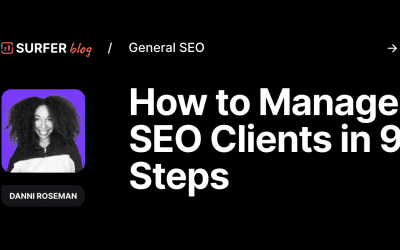So you’ve put in the time and effort into optimizing your website for search engines, but now you’re left wondering how long it will take to see the results. Well, the answer is not as straightforward as you may hope.
While some changes can have an immediate impact, the true effectiveness of your SEO efforts can take anywhere from a few weeks to several months to see noticeable results.
This article will explore the factors that influence the timeline of SEO results and provide insights on what you can expect along the way.
Learn more about SEO from our Blog
Factors that Influence the Timeframe for SEO Results
When it comes to SEO, many factors come into play that can affect the timeframe for seeing results. Understanding these factors is crucial for setting realistic expectations and developing an effective SEO strategy. Let’s explore some of the key factors that can influence the time it takes to see results from SEO efforts.
Competitiveness of the Industry
The competitiveness of the industry you operate in plays a significant role in how quickly you can see results from your SEO efforts. In highly competitive industries, where many businesses are vying for top positions in search engine rankings, it may take longer to see significant improvements. On the other hand, in less competitive industries, you might be able to achieve faster results.
Quality of SEO Efforts
The quality of your SEO efforts also directly impacts the timeframe for seeing results. Using outdated or black hat SEO techniques can have detrimental effects on your website’s ranking and visibility. It’s essential to invest in high-quality SEO practices, such as optimizing your website structure, creating valuable and relevant content, and building authoritative backlinks. The more comprehensive and effective your SEO efforts, the faster you are likely to see positive results.
Website Age and Authority
The age and authority of your website are crucial factors in determining how long it takes to see SEO results. Older websites with an established online presence may already have some level of authority in search engines’ eyes, making it easier to rank higher for relevant keywords. Conversely, if you have a new website or a domain with little authority, it may take longer to build trust and visibility in search engine results pages (SERPs).
Content and Keywords
The content on your website and the keywords you target are fundamental to SEO success. Creating high-quality, relevant, and engaging content is not only beneficial for your visitors but also helps search engines understand your website’s purpose and relevance. If your content is well-optimized with targeted keywords, it can help improve your website’s visibility and organic rankings. However, keep in mind that it may take time for search engines to crawl and index your new or updated content, impacting the timeframe for results.
Technical SEO Factors
Technical SEO factors, such as website performance, mobile optimization, crawlability, and site speed, are essential for search engines to effectively crawl, index, and rank your website. Ensuring that your website meets technical SEO best practices is crucial for improving your visibility in search engine results. Addressing any technical issues promptly can positively impact how quickly search engines recognize and rank your website.
Short-term SEO Results
While SEO is generally a long-term strategy, there are some short-term results and immediate changes that you can expect to see.
Immediate Changes and Impact
Some changes made to your website, such as optimizing meta tags, improving site speed, or fixing broken links, can have an immediate impact on your website’s performance. These quick fixes can help search engines better understand your site’s content and improve user experience. While the immediate impact may not be significant, these changes set the foundation for long-term SEO success.
Ranking Fluctuations
After making SEO changes to your website, you may notice fluctuations in your search engine rankings. It is common for rankings to vary as search engines adjust their algorithms and reevaluate your website’s relevancy. These fluctuations can occur in the short term, but they usually stabilize as your website gains authority and the search engines recognize the improvements you’ve made.
Long-term SEO Results
Building trust, authority, and sustainable organic traffic growth are the main goals of long-term SEO efforts.
Building Trust and Authority
Establishing trust and authority with search engines takes time. By consistently implementing white hat SEO techniques, creating valuable content, and earning authoritative backlinks, you can gradually build your website’s credibility. The more trust and authority your website gains, the higher it is likely to rank in search engine results.
Sustainable Organic Traffic Growth
One of the most significant benefits of long-term SEO efforts is sustainable organic traffic growth. As your website climbs up the search engine rankings for targeted keywords, you can expect a steady increase in organic traffic. This growth is a result of consistent SEO efforts and the cumulative impact of various optimization strategies.
Timeline for SEO Results
While every website is unique and results may vary, understanding the general timeline for SEO results can help set realistic expectations. Here’s a breakdown of what you can typically expect:
First 2-4 Weeks: Initial Optimizations
During the first few weeks, your focus should be on conducting comprehensive keyword research, optimizing on-page elements, and enhancing the technical aspects of your website. These initial optimizations lay the groundwork for your ongoing SEO strategy.
2-6 Months: Early Progress
In the subsequent months, you should start to see early progress in your SEO efforts. This could include improvements in keyword rankings, increased organic traffic, and better website visibility. However, keep in mind that the extent of progress may vary depending on the factors mentioned earlier.
6-12 Months: Consistent Growth
Around the six to twelve-month mark, with continuous SEO efforts, you can expect to see more consistent growth. Your website’s authority and visibility should increase, resulting in higher rankings, increased organic traffic, and improved conversion rates.
12+ Months: Long-Term Strategy
After a year or more of dedicated SEO efforts, you will be well on your way to implementing a long-term strategy. By continuously refining and expanding your SEO tactics, you can achieve sustained growth and maintain a competitive edge in your industry.
Measuring and Tracking SEO Efforts
To gauge the effectiveness of your SEO efforts and make data-driven decisions, it’s crucial to measure and track various metrics. Here are some key areas to focus on:
Keyword Ranking Tracking
Monitor the performance of your chosen keywords by tracking their rankings in search engine results over time. This will help you understand which keywords are driving organic traffic and identify areas for improvement.
Website Traffic and Analytics
Use website analytics tools like Google Analytics to track website traffic, engagement metrics, and user behavior. By analyzing this data, you can gain insights into your website’s performance, identify trends, and make informed decisions to optimize your SEO strategy.
Conversion Metrics
Track conversion metrics such as leads, sales, or other desired actions on your website. This will enable you to measure the impact of your SEO efforts on your bottom line and assess the effectiveness of your optimization strategies.
Tips to Expedite SEO Results
While SEO is a long-term endeavor, there are a few strategies you can employ to expedite results and maximize your efforts:
Focus on High-Impact Actions
Identify and prioritize high-impact SEO actions that can yield significant results. This might include targeting highly relevant keywords, creating exceptional content, or earning authoritative backlinks. By focusing on these actions, you can make the most of your resources and accelerate your SEO progress.
Strategize Off-Page SEO Efforts
Off-page SEO, such as link building and brand mentions, plays a critical role in improving your website’s authority. Develop a solid off-page SEO strategy to build quality backlinks and enhance your online presence. This can help expedite the process of building trust and authority with search engines.
Continuously Monitor and Optimize
SEO is an ongoing process, even after you start seeing results. Regularly monitor your website’s performance, make data-driven optimizations, and adapt your strategy as needed. By continuously refining and improving your SEO efforts, you can expedite results and stay ahead of the competition.
Realistic Expectations for SEO Results
When it comes to SEO, it’s important to set realistic expectations. Various factors can influence the timeline for results, and each website’s journey is unique. Here are a few factors to consider when managing your expectations:
Varied Results Based on Industry and Competition
Different industries have varying levels of competition and complexity. Highly competitive sectors may require more time and effort to achieve significant SEO results. It’s essential to assess your industry’s landscape and set expectations accordingly.
Patience and Persistence Required
SEO is not a quick fix. It requires patience, persistence, and a long-term commitment. Results may not be immediate, but with consistent efforts, you can achieve sustainable growth and long-lasting benefits.
Importance of Consistent SEO Efforts
To maintain and improve your SEO results, consistent effort is necessary.
Continuous SEO Efforts Drive Ongoing Results
SEO is not a one-time action; it’s an ongoing process. Search engine algorithms constantly evolve, and competitors continuously optimize their websites. By consistently refining and expanding your SEO efforts, you can stay ahead of the curve and maintain your search engine rankings.
Algorithm Updates and Industry Changes
Search engine algorithms undergo regular updates to provide users with the most relevant and valuable results. These updates can impact your website’s rankings. By staying abreast of algorithm changes and adapting your SEO strategy accordingly, you can better navigate through these updates and maintain your SEO performance.
Different SEO Strategies and Their Timeframes
The timeline for SEO results can also vary depending on the type of SEO strategy you employ.
Local SEO vs. National or Global SEO
Local SEO strategies, aimed at targeting a specific geographic location, can yield results relatively faster. With a narrower target audience and less competition, you may see quicker improvements in local search rankings. However, national or global SEO strategies, targeting broader audiences, may take more time to achieve significant results due to the increased competition.
New Websites vs. Established Websites
Newly launched websites may require more time to gain visibility and build authority. Building trust with search engines takes time, and new websites typically lack the historical data and established online presence that older websites possess. Established websites, on the other hand, may see faster results due to their existing authority and reputation.
Conclusion
SEO results can take time, but with the right strategies, dedication, and patience, you can achieve significant improvements in your website’s visibility, organic traffic, and overall performance. Understanding the factors that influence the timeframe for SEO results and setting realistic expectations will help you develop an effective and successful SEO strategy. Remember, SEO is a continuous process that requires ongoing monitoring, optimization, and adaptation to maintain your visibility and outshine your competitors in the ever-evolving digital landscape.









